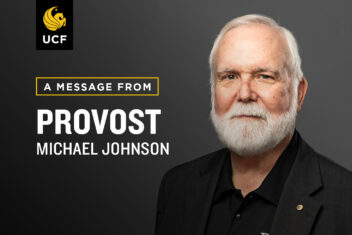I am writing to inform you about new state legislation addressing intellectual freedom.
UCF is deeply committed to civil discourse and free expression; we are determined to be a campus community where differing views can be discussed and debated, and where everyone feels free to express their own understanding. Truth emerges from the conflict of ideas shaped by reason and evidence. And educators have known since Socrates that discussion and disagreement can sharpen students’ ability to reason and to distinguish evidence and reasoning from opinion and ideology.
A new statute, HB 233, the Intellectual and Viewpoint Diversity Act, is designed to ensure that Florida’s public university campuses are indeed places where this open and civil discourse can occur. The legislation took effect July 1. I want to highlight two key provisions. First, students are permitted to record class lectures using video and audio for their own personal educational use or in connection with a complaint to the university, or as evidence in a legal proceeding. However, there are recording restrictions, and the new statute prohibits publishing the lecture in any form without consent of the lecturer. Violators are subject to penalties under the legislation and also under the University’s Student Code of Conduct as described in the Golden Rule.
To help inform and guide faculty, a faculty committee has developed additional information that includes FAQs and an optional syllabus statement as part of the faculty Syllabus Statement page. If you have additional questions, please reach out to Faculty Excellence at facultyexcellence@ucf.edu. UCF’s Office of Student Involvement has created FAQs for students about the statute.
The legislation’s second significant provision requires an annual survey across the State University System addressing whether faculty, staff, and students feel free to express their beliefs and viewpoints in class and on campus, and whether the exploration of differing ideological and political perspectives is encouraged. The legislation requires the Florida Board of Governors to develop the survey and to compile and publish the results annually, beginning September 1, 2022.
I expect the survey results to be positive, because we are a community that values civil discourse. But if the results show shortcomings, they will be a useful guide to any needed improvement – just as UCF uses the COACHE survey to identify any aspects of the university’s culture that may need improvement.
For more about the legislation, please see the House of Representatives’ final staff analysis. I am grateful for all you do to help make UCF a place where civil discourse thrives, and I hope that all of you are having a pleasant summer.


